The world's housing markets continue to surge, and the boom now includes Europe, North America, and some parts of Asia. Of the five strongest housing markets in our global survey, three are in Europe (Ireland (+10.81%), Estonia (+8.99%) and Iceland (+6.19%)) while the other two (Hong Kong (+16.43%) and the Philippines (+6.61%)) are in Asia.
The biggest y-o-y house-price declines were in UAE (-11.72%), Russia (-11.13%), and Ukraine (-10.64%).
During the year to Q2 2015, house prices rose in 24 of the 39 world's housing markets which have so far published housing statistics, using inflation-adjusted figures. The more upbeat nominal figures, more familiar to the public, showed house price rises in 28 countries, and declines in 11 countries.
Momentum. In Q2 2015, 22 housing markets showed stronger upward momentum, while 17 housing markets showed weaker momentum. Momentum is a measure of the "change in the change"; simply put, momentum has increased if a property market has risen faster this year than last (or fallen less).
Inflation-adjusted figures are used throughout this survey, which covers the period till end of second quarter of 2015. In the case of Kiev, Ukraine, the Global Property Guide adjusts using the official U.S. inflation rate since Ukrainian secondary market dwelling sales are denominated in U.S. dollars, as is the house-price index.
 |
| Source: Various series, data descriptions and sources here |
By Region:
- Europe's property markets continue to rise spectacularly. Three of the five strongest housing markets in our global survey are in Europe. Overall, 13 of the 20 European housing markets for which figures are available in Q2 2015 showed rising house prices compared to the previous year.
- Some of Europe remains depressed. Russia is now the second weakest housing market in our global survey and saw the biggest annual house price decline in Europe. Russia's residential property prices dropped 11.13% y-o-y in Q2 2015, worse than the decline of 5.96% y-o-y to Q2 2014 and the biggest annual drop since Q4 2011. During the latest quarter, house prices dropped 2.92% in Q2 2015.
- Asia goes two ways - half of Asia is strong. Hong Kong is the top performer in our global house price survey. Hong Kong's residential property prices surged by 16.43% during the year to Q2 2015, a sharp turnaround from a drop of 0.66% during the previous year to Q2 2014. Hong Kong's housing market slowed sharply in the first half of 2014 due to government cooling measures, but then bounced strongly back. Housing prices rose by 3.83% q-o-q during Q2 2015.
- Half of Asia continues to lose steam. Prices continue to fall in five of the ten Asian markets for which figures are available in Q2 2015. Four performed worse than the previous year. Singapore's housing market continues to struggle, with house prices falling by 3.38% during the year to Q2 2015, its seventh consecutive quarter of house price falls. House prices fell by 0.69% q-o-q during the latest quarter.
- North America's housing markets are strong. The S&P/Case-Shiller seasonally-adjusted national home price index rose by 4.39% during the year to end-Q2 2015, stronger than last year's rise of 4.15% y-o-y to Q2 2014. Also stronger was the Federal Housing Finance Agency's seasonally-adjusted purchase-only U.S. house price index, which rose by 5.39% y-o-y to Q2 2015, up from a rise of 3.49% during the year to Q2 2014. As a reminder, all figures are inflation-adjusted.
- Dubai's house price falls are accelerating; Israel remains strong. After spectacular house price rises from 2012 to 2014, Dubai's residential property prices plunged 11.72% during the year to Q2 2015, the second consecutive quarter of house price falls, and the biggest y-o-y drop since Q1 2011. Dubai's house prices dropped 4.28% during the latest quarter.
- New Zealand's housing market is mixed, with nationwide median house prices rising by a healthy 5.19% during the year to Q2 2015, only slightly less than the rise of 6.66% during the year to Q2 2014. However, house prices dropped a surprising 5.61% q-o-q during the latest quarter, Q2 2015.
- South Africa's housing market is slowing, with the price index for medium-sized apartments rising by a meagre 0.6% during the year to Q2 2015. House prices actually dropped 1.02% q-o-q in Q2 2015.
- Brazil's house prices continue to fall, amidst economic recession and a depreciating currency. In Sao Paulo, house prices dropped 3.52% during the year to Q2 2015, In contrast to a 5.37% increase during the year to Q2 2014. Quarter-on-quarter, house prices dropped 1.61% during the latest quarter.
Ireland's residential property prices continue to soar, rising 10.81% during the year to end-Q2 2015, slightly down from a y-o-y increase of 11.97% in Q2 2014. During the latest quarter, Q2 2015, Irish house prices increased 0.47%.
Estonia remains the second best performer in Europe and the third fastest rising housing market in our global survey, despite a slowdown in price-rises compared to last year. In Tallinn the average price of dwellings rose by 8.99% during the year to Q2 2015, considerably less than the increase of 16.1% during the same period last year - and the lowest growth since Q2 2013. Tallinn house prices dropped 0.81% q-o-q in Q2 2015.
Iceland's house prices rose by 6.19% y-o-y in Q2 2015, after annual increases of 6.09% during the same period last year. House prices were almost unchanged in Q2 2015 from the previous quarter.
Other strong European housing markets included Romania, with house prices rising by 4.83% during the year to Q2 2015, Norway (4.26%), UK (4.11%), Germany (3.93%), Switzerland (2.76%) and Netherlands (2.11%). All, except the UK and the Netherlands, performed better in Q2 2015 compared to a year earlier. Moreover, all saw positive quarter-on-quarter growth rates during the latest quarter.
European housing markets with minimal house price rises included Portugal, with house prices rising by 1.53% during the year to Q2 2015, Lithuania (1.15%), Slovak Republic (0.92%), and Latvia (0.65%). Only Portugal saw positive quarterly growth during the latest quarter. In addition, only Portugal and Slovak Republic performed better in Q2 2015 compared to the previous year.
Ukraine's housing market continues to struggle, amidst an economic and political crisis. In Kiev, average prices of new residential properties plunged by 10.64% during the year to Q2 2015. Quarter-on-quarter, house prices fell by 1.61% in Q2 2015. These sharp house price falls are mainly attributable to the high interest rates imposed to fight hyperinflation.
Other weak European housing markets included Greece, with house prices falling by 3.88% during the year to Q2 2015, Spain (-3.56%), Cyprus (-3.18%), Zagreb, Croatia (-2.42%), and Finland (-0.79%). All, except Finland, saw price falls during the latest quarter. Despite this, house prices in Greece, Cyprus and Finland rose more during the year to Q2 2015 than the previous year. Spain and Croatia's price falls, greater than last year, were disappointing.
In the Philippines, the average price of 3-bedroom condominium units in Makati CBD rose by 6.61% during the year to Q2 2015, an acceleration from the modest 2.73% price increase during the year to Q2 2014. Housing prices increased 0.91% q-o-q during Q2 2015.
Likewise, Japan's housing market rose strongly during the year to Q2 2015, thanks to Prime Minister Shinzo Abe's economic stimulus package. In Tokyo, the average price of existing condominiums rose by 6.13% during the year to Q2 2015, up from a growth of 2.68% the previous year. However, property prices dropped during the latest quarter (Q2 2015) by 0.5%.
In Thailand, housing prices rose by 3.72% during the year to Q2 2015, mildly up from an annual growth of 2.28% the previous year. However house prices fell during the latest quarter, by 1.12%.
In South Korea, The nationwide housing purchase price index rose by 2.03% during the year to Q2 2015, in contrast with a 0.42% annual decline during the year to Q2 2014. House prices increased by 0.65% q-o-q during the latest quarter.
Taiwan's house prices dropped 2.16% during the year to Q2 2015, a sharp turnaround from the previous year's rise of 5.2%, due to government cooling measures. During the latest quarter (Q2 2015), house prices increased by 1.67%.
In Indonesia, residential prices in the country's 14 largest cities fell by 1.74% during the year to Q2 2015, in contrast with last year's y-o-y rise of 0.74%. House prices fell by 0.14% q-o-q during the latest quarter.
Vietnam's house prices fell 0.27% y-o-y to Q2 2015, similar to the 0.03% decline during the year to Q2 2014.
China's house price falls are now decelerating. Shanghai's second-hand houses price index fell only 0.12% during the year to Q2 2015. In fact during the latest quarter house prices in Shanghai actually rose by 3.37%.
Canada's house prices rose by 4% in the country's eleven major cities during the year to Q2 2015, up from 2.03% the same period last year, and the biggest increase since Q1 2012. During the latest quarter (Q2 2015) Canadian house prices increased 1.78%.
In contrast, Israel's housing market remains robust. The nationwide average price of owner-occupied dwellings rose by 5.22% during the year to Q2 2015, only slightly less than last year's rise of 5.95% to Q2 2014. However, house prices actually dropped 1.31% q-o-q in Q2 2015.
 |
| Source: Various series, data descriptions and sources here |
Europe's property market boom continues
Three of the five strongest housing markets in our global survey are in Europe. Overall, 13 of the 20 European housing markets for which figures are available in Q2 2015 showed rising house prices compared to the previous year.
Ireland continues to impress, with residential property prices soaring by 10.81% during the year to end-Q2 2015, slightly down from a y-o-y increase of 11.97% last year to Q2 2014. During the latest quarter (Q2 2015), Irish house prices increased 0.47%.
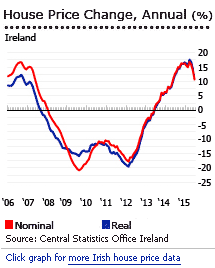
The Irish economy is now the fastest-growing economy in the EU, with GDP growth of 4.8% last year, after meagre growth of 0.17% in 2013 and a contraction of 0.3% in 2012. The Irish economy is expected to grow by a robust 5% to 6% this year.
Estonia remains the second best performer in Europe and the third best housing market in our global survey, despite a slowing property market in its capital city. In Tallinn the average price of dwellings rose by 8.99% during the year to Q2 2015, considerably less than the annual increase of 16.1% the previous year. House prices dropped 0.81% q-o-q in Q2 2015.
The number of purchase-sale contracts of real estate increased by 5.5% y-o-y to 12,208 units in Q2 2015, while the value of real estate transactions surged 20.2% over the same period, according to Statistics Estonia. Economic growth stood at 1.9% y-o-y in Q2 2015, slightly up from a 1.1% growth in the previous quarter. Estonia's economy is expected to grow by a modest 2% this year, after growth rates of 2.1% in 2014, 1.6% in 2013, 4.7% in 2012, 8.3% in 2011, and 2.5% in 2010.
Iceland's house prices rose by 6.19% y-o-y to Q2 2015, after annual increases of 7.71% in Q1 2015, 5.18% in Q4 2014, 6.69% in Q3 2014, 6.09% in Q2 2014 and 7.37% in Q1 2014. However, house prices were almost unchanged during the latest quarter, Q2 2015.
Iceland's economy is expected to grow 3.5% this year, thanks to booming tourism. Growth was 1.8% in 2014, 3.5% in 2013, 1.1% in 2012, and 2.1% in 2011.
Other strong European housing markets included Romania, with house prices rising by 4.83% during the year to Q2 2015, Norway (4.26%), UK (4.11%), Germany (3.93%), Switzerland (2.76%) and Netherlands (2.11%). All, except the UK and the Netherlands, performed better in Q2 2015 compared to a year earlier. Moreover, all saw positive quarter-on-quarter growth rates during the latest quarter.
European housing markets with minimal house price rises included Portugal, with house prices rising by 1.53% during the year to Q2 2015, Lithuania (1.15%), Slovak Republic (0.92%), and Latvia (0.65%). Only Portugal saw positive quarterly growth during the latest quarter. In addition, only Portugal and Slovak Republic performed better in Q2 2015 compared to the previous year.
Several European housing markets did poorly
Russia is now the second weakest housing market in our global survey and saw the biggest annual house price decline in Europe. Residential property prices dropped 11.13% y-o-y to Q2 2015, worse than the previous year's y-o-y decline of 5.96% to Q2 2014 and the biggest annual drop since Q4 2011.
Note that there is a substantial difference between the nominal y-o-y decline in Russian house prices (-2.97%) and the real decline (-11.13%), due to Russia's very high inflation rate. House prices dropped 2.92% during the latest quarter (Q2 2015). Russia's housing market continues to suffer due to a serious financial crisis caused by the Ukraine conflict and falling oil prices.
The Russian economy was estimated to have contracted by 3.5%-4% annualized in Q2 2015. Overall, the economy is projected to contract by 3.8% this year, after growth of 0.6% in 2014, 1.3% in 2013, 3.4% in 2012 and 4.3% in 2011, according to the IMF.
From the perspective of a US$ buyer the price decline has been much greater, since the value of the Rouble has fallen from RUB 32.9698 = US$1 in August 2013, to RUB 65.2372 = 1US$ in August 2015.
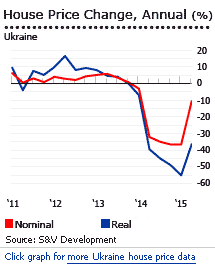
Ukraine's housing market is still in the doldrums, amidst economic and political crisis. Average prices of new residential properties plunged by 10.64% in Kiev during the year to Q2 2015, after annual declines of 36.57% in Q1 2015, 37.38% in Q4 2014, 36.12% in Q3 2014, 33.49% in Q2 2014 and 4.53% in Q1 2014. Quarter-on-quarter, house prices fell by 1.61% in Q2 2015.
By early 2015, the hryvnia had lost about three-quarters of its value in relation to the US dollar over the past year. Inflation stood at 43.8% in August 2015, having peaked at 60.9% in April 2015 after a plunge in the national currency and an increase in household utility bills. In response, the central bank raised the benchmark interest rate from 19.5% to 30% in March 2015, the world's highest. The economy is expected to shrink 9% this year, after contracting by 6.8% in 2014 and 0.03% in 2013, according to the IMF.
Other weak European housing markets included Greece, with house prices falling by 3.88% during the year to Q2 2015, Spain (-3.56%), Cyprus (-3.18%), Zagreb, Croatia (-2.42%), and Finland (-0.79%). All, except Finland, saw negative quarterly growth during the latest quarter. Despite this, Greece, Cyprus and Finland showed better performance in Q2 2015 as compared to the previous year.
Several Asian housing markets experienced strong house price-rises
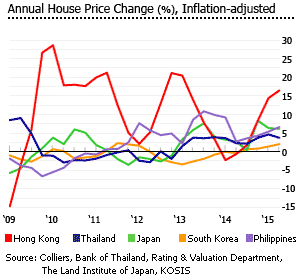
Hong Kong residential property prices surged by 16.43% during the year to Q2 2015, a sharp turnaround from the y-o-y drop of 0.66% during the previous year to Q2 2014. Housing prices rose by 3.83% q-o-q during Q2 2015.
Housing demand remains strong in Hong Kong. During the first half of 2015, the total number of homes sold skyrocketed by 20.4% from the same period last year, to 32,261 units, according to the Ratings and Valuation Department (RVD). Hong Kong's economy grew by 2.8% in Q2 2015 from a year earlier, up from 2.4% in the previous year. Hong Kong's economy is expected to grow between 2% and 3% this year, after growth rates of 2.3% in 2014, 2.9% in 2013 and 1.6% in 2012.
In the Philippines, the average price of 3-bedroom condominium units in Makati CBD rose by 6.61% during the year to Q2 2015, an acceleration from the modest 2.73% price increase during the previous year to Q2 2014. Housing prices increased 0.91% q-o-q during Q2 2015.
Makati CBD property prices soared by 19.5% from Q1 2011 to Q4 2013, amidst rapid economic growth. The Philippine economy expanded by a healthy 5.6% y-o-y in Q2 2015. Economic growth is expected between 6% and 6.5% this year, after real GDP growth rates of 6.1% in 2014, 7.2% in 2013 and 6.8% in 2012.
Likewise, Japan's housing prices rose strongly during the year to Q2 2015, thanks to Prime Minister Shinzo Abe's economic stimulus. In Tokyo, the average price of existing condominiums rose by 6.13% during the year to Q2 2015, up from growth of 2.68% the previous year. However, property prices dropped 0.5% q-o-q in Q2 2015.
Existing condominium sales in Tokyo rose slightly by 2.2% to 15,330 units in the first five months of 2015 compared to the same period last year, according to The Land Institute of Japan. The Japanese economy actually contracted by an annualized 1.6% in Q2 2015, in contrast with an expansion of 4.5% in the previous quarter. The economy shrank by 0.06% last year but is expected to return to growth this year with real GDP growth of 1.04%.
However Japan's gains have been completely counterbalanced, from a US$-based investor's perspective, by the decline of the Japanese Yen from ¥78.68= 1US$ in August 2012, to ¥123.24 = 1US$ in August 2015.
In Thailand, housing prices rose by 3.72% during the year to Q2 2015, a slight improvement from the annual growth of 2.28% in the previous year. However house prices fell by 1.12% during the latest quarter.
The Thai economy is projected to grow by a modest 3.7% this year, after annual growth of 0.7% in 2014, 2.9% in 2013 and 6.5% in 2012, according to the IMF.
South Korea's nationwide housing purchase price index rose by 2.03% during the year to Q2 2015, in contrast with the 0.42% annual decline in Q2 2014. This is the biggest y-o-y rise since Q3 2011, amidst lower interest rates and relaxed mortgage lending rules. House prices increased by 0.65% q-o-q during the latest quarter.
Home sales stood at 500,413 units in the first five months of this year, the highest level since 2006. Korea's economy is expected to expand by 3.3% this year, almost the same growth as last year.
Yet half of Asia is now struggling
Five of the ten Asian markets for which figures are available in Q2 2015 continued to show falling house prices. Four performed worse than the previous year.
Singapore's housing market continues to struggle, with house prices falling by 3.38% during the year to Q2 2015, its seventh consecutive quarter of house price falls. House prices fell by 0.69% q-o-q during the latest quarter.
Both demand and supply continue to fall in Singapore. The number of private residential units sold plummeted by 24% y-o-y to 1,999 units in Q2 2015, according to the Urban Redevelopment Authority. On the other hand, the number of uncompleted private residential units launched also plummeted by about 26.2% to 2,099 units over the same period.
Singapore's economy grew by 1.8% in Q2 2015 from a year earlier, sharply lower than the 2.8% y-o-y growth the previous quarter, according to the Ministry of Trade and Industry (MTI). However, on a q-o-q seasonally-adjusted annualised basis, the economy actually contracted by 4% in Q2, a reversal from the 4.1% growth in the previous quarter.
Singapore's economy is expected to grow between 2% and 2.5% this year, after growth of 2.9% in 2014, 3.9% in 2013, 2.5% in 2012, and 6% in 2011.
Taiwan's nationwide house prices dropped 2.16% during the year to Q2 2015, due to the government's recent housing market cooling measures, a sharp turnaround from the robust rise of 5.2% a year earlier. House prices increased 1.67% during Q2 2015.
In August 2015, housing transactions in Taipei fell to 16-year low, according to Yung Ching Realty Group. Residential property transactions are expected to remain depressed during the remaining months of the year amid concerns over a government tax reform plan which is expected to raise the tax burden on property investors.
Residential property prices in Taiwan are likely to fall by 5%-10% per year over the next two years due to a supply glut and weakening affordability, according to Taiwan Ratings. In Q2 2015, Taiwan's economy grew by a meagre 0.64% from a year earlier, the weakest growth in three years, amidst slowing demand from China, according to the Directorate General of Budget, Accounting and Statistics. The country's real GDP growth rate stood at a modest 3.7% in 2014, from 2.2% in 2013, 2.1% in 2012 and 3.8% in 2011, according to the IMF.
In Indonesia, residential prices in the country's 14 largest cities fell by 1.74% during the year to Q2 2015, the second consecutive quarter of y-o-y price falls since Q3 2012 and in contrast with the annual rise of 0.74% in a year earlier. House prices actually fell by 0.14% q-o-q during the latest quarter.
In an effort to attract foreign investors, the Indonesian government unveiled in June 2015 a plan to finally allow foreigners to purchase luxury apartments in the country.
In Q2 2015, the Indonesian economy expanded by 4.67% from a year earlier, slightly lower than the 4.72% growth seen in Q1 2015 and the lowest level since 2009.
Vietnam's housing market continued lacklustre, with house prices falling 0.27% y-o-y in Q2 2015.
Effective July 1 2015, the government introduced a new law allowing foreigners with a valid visa and foreign companies and international organizations operating in Vietnam to buy houses and apartments. Previously, only those married to Vietnamese or foreigners deemed to be contributing to national development could buy property.
Vietnam's GDP grew by 6.28% in the first half of 2015 from a year earlier, up from 5.18% during the same period last year, and the fastest growth since 2008, according to the General Statistics Office. Vietnam's economy grew by 5.98% in 2014, 5.4% in 2013, 5.2% in 2012 and 6.2% in 2011, according to the IMF.
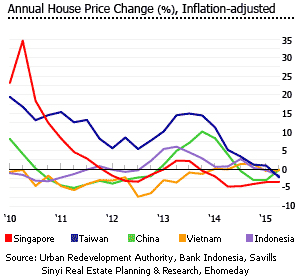
China's house price falls are now decelerating, after many government measures supporting the housing market. In Shanghai the price index of second-hand houses fell slightly by 0.12% during the year to Q2 2015, its fourth consecutive quarter of annual price falls. However during the latest quarter house prices in Shanghai actually rose by 3.37%.
In an effort to avert a property market crash, the Chinese government recently announced a plan to purchase unsold residential properties and convert them into low-cost housing to reduce inventory levels. Over the past year the government eased property curbs, and on September 30, 2014 the central bank loosened mortgage restrictions, giving homeowners with paid-off mortgages who want a second property the same advantages as first-time buyers, including a 30% minimum down payment (previous minimum: 60%). The central bank cut its benchmark one-year lending rate by 25 basis points to 4.6% in August 2015, the fifth rate cut since November 2014.
Sentiment on home prices in China picked up in Q2 2015 and the number of families that increased their housing spending rose by 3.7% in Q2 2015 from the previous quarter, according to the China Household Finance and Survey Centre.
The Chinese economy grew by an annualized rate of 7% in the first half of 2015. Economic growth is projected at 6.8% this year, down from 7.4% in 2014, 7.7% in 2013, 7.8% in 2012 and 9.3% in 2011, according to the IMF.
U.S. house prices continue to rise strongly
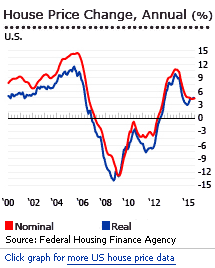
The S&P/Case-Shiller seasonally-adjusted national home price index rose by 4.39% during the year to end-Q2 2015 (inflation-adjusted), after annual rises of 4.36% in Q1 2015, 3.77% in Q4 2014, 3.04% in Q3 2014, 4.15% in Q2 2014, and 7.28% in Q1 2014. House prices increased by 2.3% during the latest quarter.
The Federal Housing Finance Agency's seasonally-adjusted purchase-only U.S. house price index rose by 5.39% y-o-y in Q2 2015, up from an annual increase of 3.49% in Q2 2014 (inflation-adjusted). However, the index increased by a meagre 0.02% q-o-q during the latest quarter.
House prices continue to rise in all 20 major U.S. cities according to the Case-Shiller index, with Denver registering the biggest inflation-adjusted increase of 10.1% y-o-y in Q2 2015, followed by San Francisco (9.4%), Dallas (8.1%), Portland (7.7%), Miami (7.6%), Seattle (7.3%), Los Angeles (6.2%) and Las Vegas (6%). Chicago and Washington saw the lowest growth in house prices at 1.3% and 1.5%, respectively.
Residential construction remains strong. New privately-owned housing units authorized rose 7.5% y-o-y to July 2015, according to the U.S. Census Bureau. Over the same period, the total number of housing starts rose by 10.1%, while housing completions soared by 14.6%.
New house sales were up by 25.8% in July 2015 from the same period last year, according to the U.S. Census Bureau. About 58% of these sales were in the South, followed by the West (25%).
U.S. home builder sentiment rose in August 2015 to 61, from 60 a month earlier, the highest level for almost a decade, according to the National Association of Home Builders. A reading of 50 is the midpoint between positive and negative sentiments.
Cheap mortgages continue to fuel housing demand. The average interest rate for 1-year adjustable rate mortgages (ARMs) was at a low at 2.52% in July 2015, while it fell slightly to 2.96% for 5-year adjustable rate mortgage, according to Freddie Mac. The average interest rate for 15-year FRMs fell to 3.21% in July 2015, and was 4.05% for 30-year FRMs.
In the second quarter of 2015, the U.S. economy grew by an annual rate of 2.3%, a sharp acceleration from a 0.6% growth in the previous quarter, thanks to strengthening consumer spending, according to the U.S. Bureau of Economic Analysis. The U.S. economy is expected to expand by 3.1% this year, the strongest growth since 2005, according to the International Monetary Fund (IMF).
Canada's housing market remains strong, although Canada is now in recession
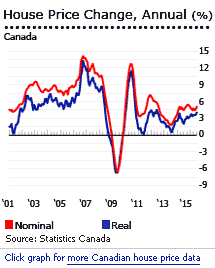
Canada's housing market remains robust, despite repeated market cooling measures and a contracting economy. House prices in the country's eleven major cities rose by 4% during the year to Q2 2015, up from 2.03% during the same period last year - and the biggest increase since Q1 2012. During the latest quarter (Q2 2015) house prices increased 1.78% q-o-q.
Biggest rises: Vancouver saw inflation-adjusted house price increases of 7.4% during the year to Q2 2015, followed by Toronto (6.7%), Victoria (4.6%), and Hamilton (4.5%). Canadian cities with minimal house price rises include Edmonton (2.6%), Quebec (1.7%), and Halifax and Winnipeg (both with 0.2%).
Biggest falls: Montreal recorded the biggest price drop of 1.4% in Q2 2015 from a year earlier, followed by Ottawa and Calgary, both with y-o-y decline of 0.8%.
Sales rose by about 3.4% in July 2015 from the same period last year, according to the Canadian Real Estate Association (CREA). Sales were up in just over half of all local markets, led by activity in the Lower Mainland of British Columbia and the Greater Toronto area. There were about 5.9 months of inventory nationally in July 2015, unchanged from the previous two months and the lowest in three years.
The Bank of Canada cut its key interest rate by 25 basis points in July 2015, to 0.50%, the second rate cut in six months, in response to plunging oil prices. The key rate had previously been at 1% since September 2010.
Canada's economy officially entered recession in the first half of the year for the first time since 2009, amidst plunging crude prices, according to Statistics Canada. The economy contracted by an annualized rate of 0.5% in Q2 2015, after contracting by 0.8% in Q1 2015.
The economy is expected to grow by just 1.1% this year, down from an initial forecast of 2%, based on survey conducted by Consensus Economics, after expanding by 2.5% in 2014.
Dubai's house price falls accelerating; Israel's housing market remains vibrant
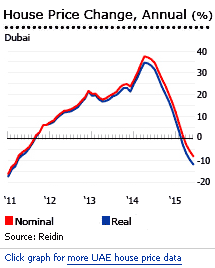
Dubai is again the world's weakest housing market in our survey. Dubai residential property prices plunged 11.72% during the year to Q2 2015, the second consecutive quarter of house price falls, and the biggest y-o-y drop since Q1 2011. House prices dropped 4.28% during the latest quarter.
Dubai's property market has been one of the world's most volatile. Dubai saw one of the world's worst housing crashes with house prices plunging by 53% from Q3 2008 to Q3 2011. The housing market started to recover in 2012, recording double-digit house price increases from Q2 2012 to Q4 2014. The property market started to show weakness in the second half of 2014, amidst housing oversupply, subdued demand and slower economic activity.
During the first half of 2015, the number of residential property transactions plunged by 69% while the value of transactions tumbled by 66% from the same period last year.
About 20,170 dwelling units are expected to be delivered this year, almost double the annual average of 11,600 units in the past three years, according to REIDIN.
Real estate consultant Jones Lang LaSalle and the ratings agency Standard & Poor's expect that average house prices in the emirate could fall by between 10% and 20% this year. Moody's sees no repeat of the epic crash of 2009, but it expects a 10% to 15% price correction this year.
The UAE's economy is projected to expand by only 3.15% this year, due to falling oil prices, after GDP growth of 3.6% in 2014, 5.2% in 2013, 4.7% in 2012 and 4.9% in 2011, according to the IMF. Dubai, which has a more diversified and less oil dependent economy, is expected to grow by about 5% this year.
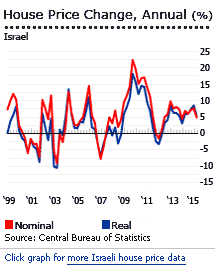
Israel's housing market remains robust. The nationwide average price of owner-occupied dwellings rose by 5.22% during the year to Q2 2015, after annual increases of 8.5% Q1 2015, 7.41% in Q4 2014, 5.94% in Q3 2014, 5.95% in Q2 2014, and 3.05% in Q1 2014. However, house prices actually dropped 1.31% q-o-q in Q2 2015.
Property demand is surging. New dwelling sales skyrocketed by 91.6% y-o-y in Q2 2015, to 7,045 units, according to the Central Bureau of Statistics (CBS). Median months on market of new dwellings stood at 3.6 in Q2 2015, down from 4.2 in the previous quarter and 4.3 in a year earlier. New dwelling supply fell by 7.7% y-o-y in Q2 2015, as the oversupply of past years is being absorbed.
Israel's economy is expected to grow by 3% this year, despite weaker-than-expected 0.3% growth in Q2 2015, according to the CBS. Economic growth stood at 2.8% last year, its slowest pace in five years, mainly due to the July-August conflict with Palestinian militants in Gaza, according to the Bank of Israel.
The Bank of Israel kept its benchmark interest rate at a record low of 0.1 in August 2015, after cutting it by 15 basis points in February 2015. The central bank is expected to keep the key rate unchanged until 2016.
New Zealand's housing market remains strong
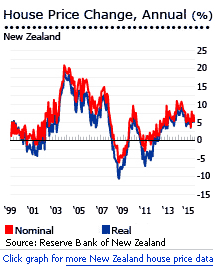
New Zealand's nationwide median house prices rose by a healthy 5.19% during the year to Q2 2015, after annual rises of 7.85% in Q1 2015, 4.6% in Q4 2014, 3.93% in Q3 2014, 6.66% in Q2 2014, and 8.36% in Q1 2014. However, house prices dropped 5.61% q-o-q during Q2 2015.
Total dwellings sold were up 37.8% y-o-y to 8,121 units in July 2015, according to the Real Estate Institute of New Zealand (REINZ). All regions recorded increases in sales volumes, with Waikato/Bay of Plenty registering the biggest y-o-y rise of about 80% in July 2015, followed by Northland (71%), and Hawkes Bay (60%) and Central Otago Lakes (60%). New dwelling consents were 2,824 units in July 2015, up by 24% from a year earlier and the highest since March 2005, according to Statistics New Zealand. Likewise, the value of residential building consents rose by 11.4% over the same period.
New Zealand's economy grew by 3.2% in Q1 2015 from a year ago, according to Statistics New Zealand. Economic growth stood at 3.2% in 2014, its strongest performance since 2007, after modest GDP growth of 2.2% in 2013, 2.4% in 2012 and 1.8% in 2011.
The Reserve Bank of New Zealand (RBNZ) cut its official cash rate (OCR) by another 25 basis points to 3% in July 2015, after a 25 basis points cut in the previous month, in an effort to boost economic growth amidst low inflation.
Brazil's housing market continues to plunge
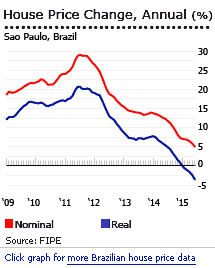
Brazil's housing market continues to plunge. In Sao Paulo, house prices dropped 3.52% during the year to Q2 2015. Quarter-on-quarter, house prices dropped 1.61% during the latest quarter.
Brazil's economy is in recession, and its currency is plummeting. And Brazilians continue to lose confidence to their president, Dilma Rousseff, partly due to the massive Petrobras corruption scandal.
Brazil officially entered recession in Q2 2015, when the economy contracted by 1.9% from the previous quarter. Giant companies such as General Motors Co., Latam Airlines, and Embraer SA, are now halting their productions, cutting their businesses, and laying off thousands of employees.
In an annual basis, Brazil's economy shrank by 2.6% in Q2 2015, after contracting 1.6% in Q1 2015. In 2014, the economy expanded by a meagre 0.15%, after growing by 2.7% in 2013, 1.8% in 2012, 3.9% in 2011 and 7.6% in 2010, according to the IMF.
The Brazilian Real has significantly depreciated. It lost 58% of its value against the U.S. dollar to reach an average monthly exchange rate of BR3.4945 = 1US$ in August 2015, down from BR2.2169 = 1US$ in July 2014.
House prices in Sao Paulo had soared by 113% (inflation-adjusted) from 2007 to 2013, while Rio De Janeiro's rose by 144%, as interest rates were progressively cut from 26% to 7.25% between 2003 and 2012.
However starting in the first half 2013, the central bank raised the benchmark interest rate nine times to 11% in April 2014, causing a sharp economic slowdown. After holding the key interest rate steady for almost seven months, the central bank decided to raise it again by 25 basis points in October 2014, and by 50 basis points in December 2014. During the first eight months of 2015, the central bank again raised the key rate five times to 14.25%, the highest level for almost six years.
South Africa's housing market slowing again
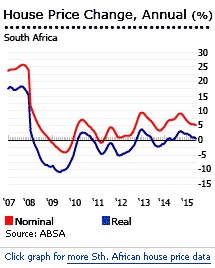
South Africa's price index for medium-sized apartments rose by a meagre 0.6% during the year to Q2 2015. House prices actually fell during the latest quarter (Q2 2015) by 1.02%.
The South African economy is expected to expand by about 2% this year, despite contracting by an annualized 1.3% in Q2 2015, according to Statistics South Africa. The economy grew by 1.5% in 2014, after growth of 2.2% both in 2013 and 2012, and 3.2% in 2011, according to the IMF.
South African Reserve Bank (SARB), the country's central bank, hiked its benchmark repurchase rate by 25 basis points to at 6% in July 2015, amidst increasing inflationary pressures, despite sluggish economic growth.